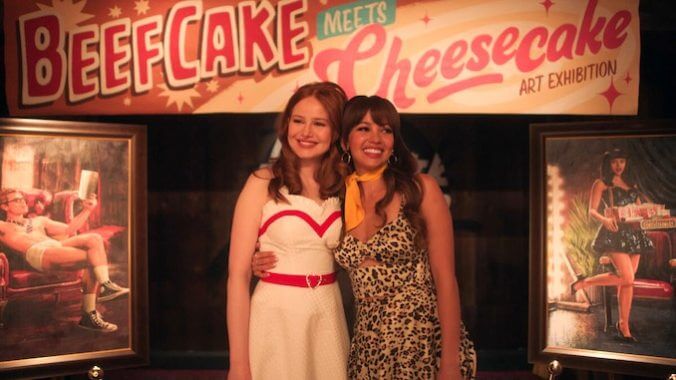With Riverdale’s Series Finale, We Are Losing the Best Lesbian Representation on TV
Photo Courtesy of The CW

It has undeniably been a rocky road for sapphic representation on screen over the past few years. While the woes began with Netflix and its penchant for canceling sapphic-led series, the blows to LGBTQ+ (but specifically lesbian and bisexual) representation just keep coming—spanning everything from The CW’s own sapphic series massacre early last year to the most recent reversal of A League of Their Own’s second season renewal at Amazon Prime. Through it all, though, there has been one beacon in the darkness: Riverdale’s own Cheryl Blossom (Madelaine Petsch).
While Cheryl’s sexuality was not confirmed on screen until Season 2, the beginnings of her lesbian journey started bubbling to the surface much earlier. Petsch (arguably the world’s greatest ally) actually suggested that Cheryl was a lesbian to Riverdale showrunner Roberto Aguirre-Sacasa while they were filming the pilot, and her story was only able to blossom from there—moving Riverdale’s sapphic representation away from the first episode’s queerbaiting kiss between Betty (Lili Reinhart) and Veronica (Camila Mendes) to something much more substantial and, frankly, still groundbreaking .
In her time on Riverdale, Cheryl has been through the wringer. Suffering at the hands of her homophobic mother both on and off screen, losing her brother, winding up in conversion therapy, having to watch the love of her life get married to someone else, and finally being the conduit for the energy that attempted and failed to save Riverdale, Cheryl’s struggles are a core element of her character, but even when that pain was connected to her sexuality, the series never leaned on homophobic stereotypes or harmful portrayals.
The original conversion therapy storyline, which took place in Season 2 and featured Toni (Vanessa Morgan) coming to Cheryl’s rescue in one of the series’ most iconic images (with Cheryl and Toni kissing in the flickering light of the conversion film playing on the projector), actually received major push-back when it first aired in 2018, but Riverdale’s willingness to acknowledge the true pain and suffering that some members of the LGBTQ community face day in and day out was a bold and well-done choice. At the time, fans argued that Cheryl being sent to conversion therapy tarnished the “positive representation” she had since provided, but the pearl-clutching surrounding “good representation” does more harm than good. Riverdale took a risk, and told a very human and heartbreaking story with Cheryl and Toni at the very center, where love won against the forces of hatred—what better way to commit to your lesbian representation from the very start than to show not only queer heartbreak, but unabashed queer joy?
From there, Cheryl continued to grow and change, and along with that came her relationship with Toni. Arguably the heart of the series, Cheryl and Toni’s (dubbed Choni) path to the endgame status they deserved was a rocky one, but provided an engaging and nuanced relationship throughout the six seasons they revolved around one another. From having their duet cut from Riverdale’s first musical episode to being the center of the show’s take on Heathers, the series itself doesn’t hold all the credit for making the Choni relationship the phenomenon that it still remains. From the start, the fans have been behind Cheryl and Toni, being loud about their lack of screentime, and fighting in particular for Toni to become her own person outside of just her relationship with Cheryl. Petsch and Morgan also became Choni’s champions, even inserting a sex scene during Season 3 “that wasn’t [originally supposed to be] there,” in order to break down the barrier of double-standards that lingered between Choni and the other canonical couples on the series.
More than anything, it has been so refreshing to see Cheryl both suffer and thrive on this weird and wonderful series. In potentially her most poignant turn as the character, Petsch managed to capture a specific type of lesbian longing during her estrangement from Toni. She questioned if she was destined to be alone, she leaned into her more unhinged wiles, and she became the kind of friend she knew Toni deserved as she began going through the motions of motherhood and eventually marriage. Even when Cheryl wasn’t with Toni, Riverdale’s wholesome portrayal of her relationship with childhood-crush-turned-second-chance-girlfriend Heather (Caroline Day) was a delight to watch. And even outside of romance, Cheryl’s mentorship of Britta (Kyra Leroux), a young lesbian student at Riverdale High, was another heartfelt portrayal of queerness and community, especially after Cheryl welcomed Britta into her home after her parents kicked her out of her own. Riverdale always knew when to lean into the angst, and by Season 6, they allowed Cheryl to happily move on from Toni and become fulfilled in other ways, even if just for a moment before they inevitably came back together.
-

-

-

-

-

-

-

-

-

-

-

-

-

-

-

-

-

-

-

-

-

-

-

-

-

-

-

-

-

-

-

-

-

-

-

-

-

-

-

-








































